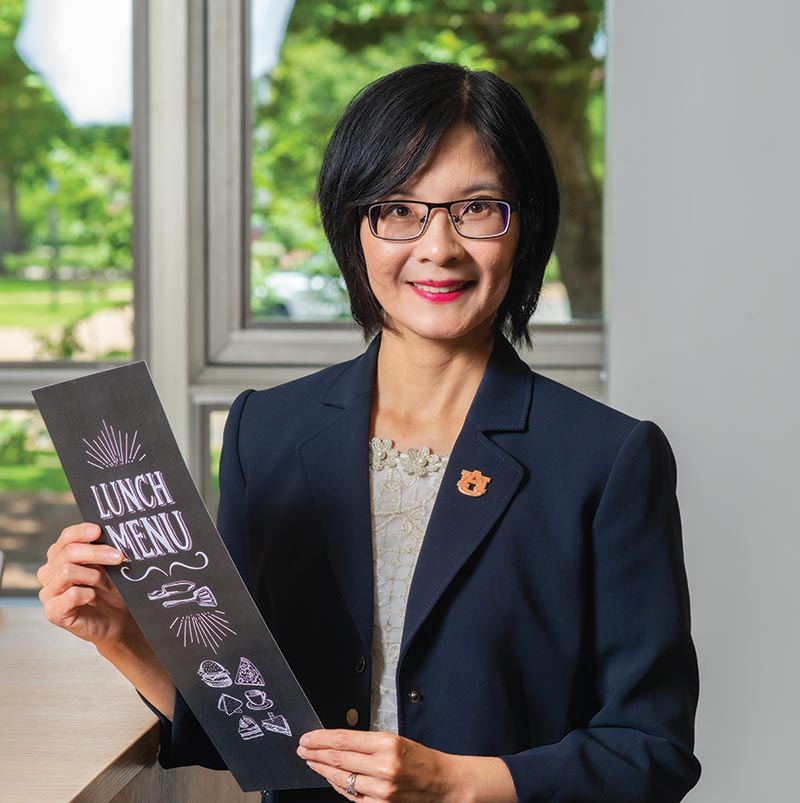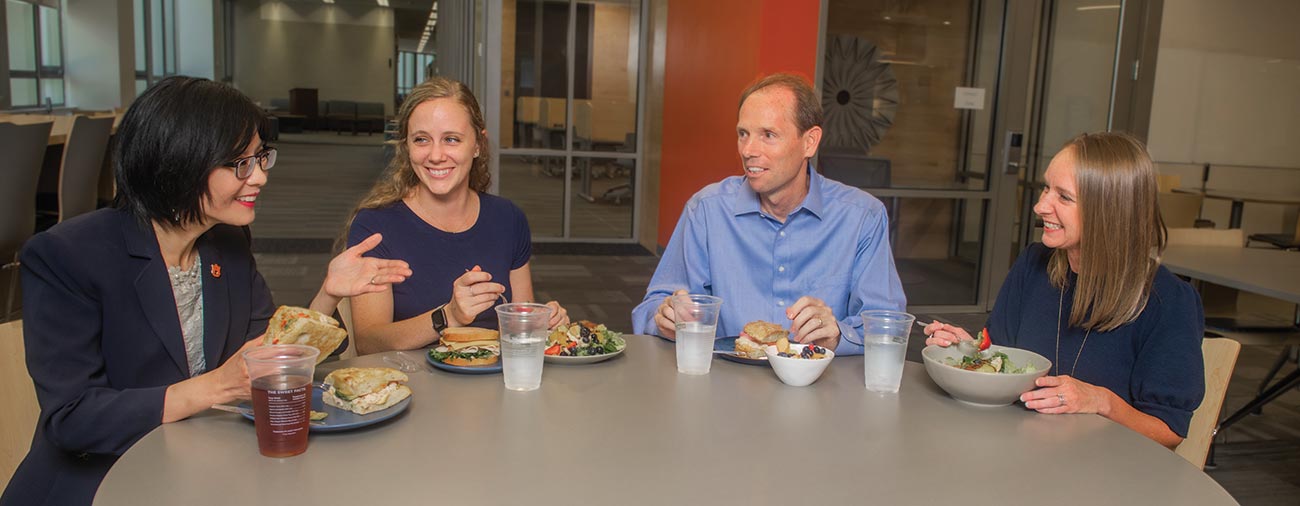Research Magazine

From having enough food to having the right food, researchers in the College of Human Sciences at Auburn University conduct cutting-edge work at the intersection of health and diet.
As the COVID-19 pandemic drove a rise in food insecurity rates for Alabama families, End Child Hunger in Alabama, or ECHA, launched a comprehensive project to ensure all Alabamians could find nutritious food near them.
The ECHA County Food Guide Project is an interactive map of Alabama counties housed on the ECHA website. Once you click on your county, you will be directed to a page that lists food resources near you. Volunteers and community partners maintain and update the map on a regular basis.
“The launch, maintenance and expansion of ECHA County Food Guides has been possible because of the numerous partnerships throughout the state,” said Dr. Alicia Powers, managing director of the Hunger Solutions Institute, the parent organization of ECHA. “While the launch of the ECHA County Food Guides was a response to the COVID-19 pandemic, HSI plans to continue to expand ECHA County Food Guides in a number of ways, volume of resources available in the guide, the general public’s awareness of the guide and accessibility of the guide via call and text in addition to the current online resource.”
An important facet of the County Food Guide Project is its inclusion of farmer’s markets and nutrition programs, as fresh produce is one of the hardest types of food to acquire under financial stress, yet one of the most important food groups in disease prevention.




Associate Professor of Nutrition Dr. Mike Greene, building on his extensive research on Mediterranean diet adherence, emphasizes the incorporation of fresh fruits and vegetables into the diet through a published paper in Frontiers in Nutrition, linking Mediterranean diet adherence to a reduction in COVID-19 cases and deaths. The paper was co-authored by Alexis Roberts, an Auburn University graduate nutrition student, and Dr. Drew Frugé, assistant professor and director of the didactic program in dietetics.
The ecological study examined Mediterranean diet adherence in 19 regions of Spain and across two dozen countries and COVID-19 cases and related deaths. Greene's team took into account factors of well-being and physical inactivity which can influence health outcomes. The research found higher adherence to a Mediterranean diet – a healthy dietary pattern that reduces inflammation and risk of chronic disease – is associated with lower regional COVID-19 cases and even mortality.
“The take-home message from the publication is that a healthy diet may play a role in COVID-19 cases and deaths,” Greene said. “It is well known that nutrition and a strong dietary pattern play a role in the prevention of chronic disease. Our recent contribution suggests that nutrition and a healthy dietary pattern play a role in infectious disease. More research is needed to understand how nutrition intersects with the prevention of infectious disease.”
In addition to preventing infectious disease, a developing school of research also points to a healthy diet’s benefits in reducing anxiety after diagnosis or prolonged medical treatment.
Auburn University nutrition/dietetics Ph.D. student and Presidential Graduate Research Fellow Krissy Smith studies how improved diets can reduce anxiety in breast cancer survivors. The research, supported by the Center for Clinical and Translational Science’s TL1 program, focuses on administering probiotics to breast cancer survivors. Past research has shown there’s beneficial bacteria in the gut that interacts with the nerve cells on the vagus nerve – the largest nerve in the body, which spans from the brain to the gut and regulates functions from internal organs to mental health.
Breast cancer survivors are a unique study population because of their anxieties and the effect of cancer treatment on the digestive system. Smith hopes further examination of the intersection of nutrition and cancer-related anxiety provides more insight on how to extend quality health care.
“All across the world, we’ve improved our technology on understanding and diagnosing cancer, as well as treating it, so we’re going to have a large population of breast cancer and other cancer survivors who live with a more rapidly declining health-related quality of life and different mental health issues. And here in the South and across the country, many African Americans are left without the quality care they deserve beyond their cancer diagnosis and beyond surviving their cancer,” Smith said. “It’s a new field, so we’re still learning which microbes are good, which microbes are bad and how they influence all of the systems in the body. The more we do this kind of research, the more we can help others.”
Registered dietitian and hospitality management associate professor Dr. Yee Ming Lee’s upcoming research is intended to bridge the gap between the restaurant experience and consumers with food allergies. In her research, Lee discovered despite the effects of food allergens on quality of life for affected individuals, a majority of restaurants do not incorporate important allergen information into their menus.
The novelty of Lee’s project, supported by the College of Human Sciences’ Y-H Peggy Hsieh Endowed Fund, is that it will provide insight into the best practices of menu design for both customers with food allergies and restaurants’ business models.

“Consumers with food allergies heavily depend on menus to make safer food choice decisions at restaurants. Many restaurants still have not identified food allergens on the menus, or the menus could be loaded with other information that makes allergen identification difficult. No study has investigated which specific menu design can better convey food allergen information to this group of consumers and is preferred by them,” Lee said. “The prototype of the restaurant menu resulting from this study will aid food allergen identification. Consequently, the quality of life of consumers with food allergies can be improved due to less stress associated with dining out, reduced missed social activities and decreased feelings of isolation.”
As researchers across disciplines approach the intersection of health and diet, the College of Human Sciences works to translate this research into practical action to improve quality of life.

